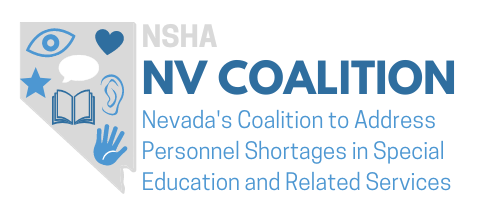
Medicaid and School Health Services
The NSHA Coalition provides technical assistance for school districts who have an interagency agreement with Nevada’s Division of Health Care Financing and Policy (DHCFP) (e.g., Nevada Medicaid Agency) in understanding and fulfilling the responsibilities as outlines in the state's Medicaid State Plan, telehealth/telepractice services and Medicaid reimbursement (Medicaid Service Manual (MSM 2800) 3400) regulations.
-
Information
· The Centers for Medicare and Medicaid Services (CMS) oversees the Nevada Medicaid program
· The State of Nevada Department of Health and Human Services (DHHS) oversees the state’s health programs
· The State Division of Health Care Financing and Policy (DHCFP) oversees the Nevada Medicaid and Nevada Check Up programs, including School Health Services (SHS)
· Nevada’s SHS are covered under Medicaid Service Manual (MSM) Chapter 2800
1965: Medicaid program established by U.S. Congress
1988: Catastrophic Medicaid Act allowed for billing in the schools
1997: Individuals with Disabilities Education Act (IDEA) recognized ability of school districts to bill Medicaid special education services
2004: IDEA re-authorized as the Individuals with Disabilities Education Improvement Act, providing expanded coverage for school services and early intervention
2006: Changes to IDEA regulations reaffirmed ability of public agencies such as school districts to use Medicaid to pay for required services
2014: CMS “Free Care” reversal; removed IEP limitation once new State Plan Amendment (SPA) and Medicaid Services Manual (MSM) Chapter are approved
2019: Nevada State Plan Amendment (SPA) approved; includes expansion of services
2020: Nevada Medicaid Service Manual (MSM) Chapter 2800 approved; includes expanded services
-
Background
Medicaid is a medical assistance program that recognizes the importance of school-based healthcare services. Medicaid encourages states to use funds from their programs to help pay for certain healthcare services delivered in the schools, provided federal and state regulations are followed. These healthcare services may include mental health services, nursing services, therapy services, physical therapy, occupational therapy, speech therapy, wheelchairs, and case management.
Nevada Medicaid may pay for some medically necessary health-related services provided by the schools when the services are written in the student’s Plan of Care (POC) and/or Individualized Education Program (IEP).
-
What & Why
The result of a partnership between public health and public education, School Health Services (SHS) are medical services provided through a Local Education Agency (LEA) or State Education Agency (SEA) for children who attend public schools in Nevada. SHS are provided to Medicaid enrolled students. SHS are medically necessary services listed in the student’s Plan of Care (POC) and/or Individualized Education Program (IEP), and/or preventive services that are coverable under the Early and Periodic Screening, Diagnostic and Treatment (EPSDT) benefits program.
The Nevada Medicaid School Health Services (SHS) program allows enrolled Local Education Agencies (LEAs)/State Education Agencies (SEAs) to receive Medicaid payment for providing qualifying health-related services.
-
Requirements
Who: Service Providers
The providers of the health-related services must meet the Medicaid qualification requirements, which may or may not be the same as the requirements to work in the schools.
Certain school-based professionals who do not meet the Medicaid qualification standards may provide services under the direction of (UTDO) a qualified Medicaid provider.
What: Documentation
The Division of Health Care Financing and Policy (DHCFP) requires LEAs to maintain a variety of documents in the Plan of Care (POC). These include but are not limited to:
-Determination of medical necessity for services
-Plans of care (i.e. health-related services covered under an IEP)
-Records of treatment sessions and progress notes
-Documentation supporting the supervision of services and ongoing involvement in the treatment (“under the direction of”)
-Documentation of practitioner’s license, certifications, registration, or credentials to practice in Nevada (i.e. Board of Examiners; National Certification)
For more information – Go to:
Nevada Medicaid School Health Services (SHS)
Nevada School Health Services Brochure:
Resources
American Speech-Language-Hearing Association (ASHA)
Student Wellness - Collaborative Roles
Search: "School Funding Advocacy"; "School Medicaid"; "School Medicaid Reimbursement"; "IDEA Medicaid"; “School Based Medicaid”
